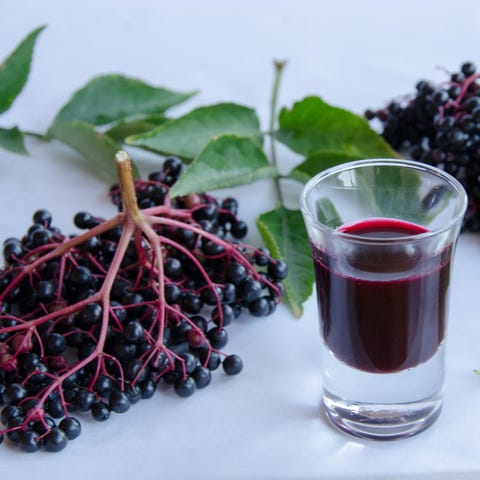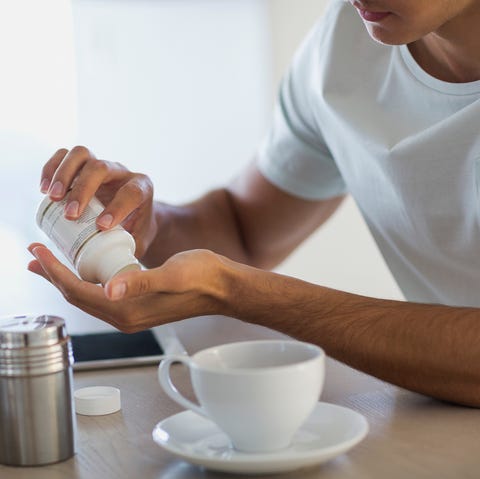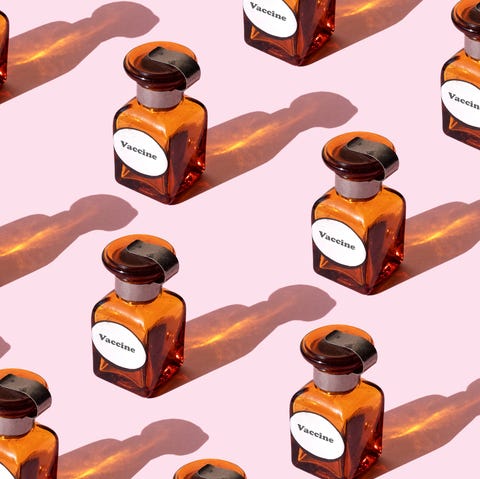Sales of immunity-boosting supplements have increased since the start of the spread of the coronavirus COVID-19, at least according to several reports.
One of these so-called miracle supplements is elderberry, which can come in the form of an extract, tincture, syrup, pill, or gummy if you’re a person who takes supplements, but prefers to chew them.
There’s some science behind elderberry supplements, but there’s also a lot of, um, “interesting” extrapolations from that science, particularly as it pertains to the prevention and treatment of the coronavirus COVID-19.

Subscribe to Men’s Health
SHOP NOW
Some of those extrapolations have become so grand that the United States Federal Drug Administration had to step in earlier this year and issue warnings.
So how did elderberry supplements, of all supplements, command the attention of so many people? What the heck is elderberry, anyway? Does consuming elderberry supplemental forms provide any benefits? And is it safe?
Here’s what the science and Registered Dietitian Abby Langer says.
What are elderberries, exactly?

JariJ
Elderberries come from elderberry shrubs, which are part of the honeysuckle family, according to this exhaustive USDA guide.
The berries themselves are small (5 to 6 millimeters wide) appearing in “nutlets” of three to five, and appear blue to purple-black when they’ve reached maturity.
Fun fact: The name “elderberry” comes from “ellen,” meaning “fire-kindler.”
Are elderberries healthy?

Westend61
Well, here’s what they can do, at least according to that USDA fact sheet.
Elderberries can act as a diuretic (they help you pee more).
Elderberries can be made into a salve to aid burns (they soothe).
Elderberries can act as a purgative (they help you poop).
Granted, these are effects that stem from traditional medicine. What about modern science’s take on elderberries as they apply to the cold and flu?
Getting to that…
Are elderberry supplements good for boosting immunity?

Letizia Le Fur
“First of all, ‘boosting immunity’ is not something desirable,” says Abby Langer, R.D. “If we boost our immune system, we get what we see in autoimmune disorders like lupus: the body attacking itself.”
Instead of boosting, Langer says, “we want to aim for a balanced immune response.”
Even with that clarification, there’s little research on elderberry supplements and the science that does exist deals largely with shortening the duration of illness after infection with cold and flu. Note: not in the prevention of viruses.
“Overall, the research is inconclusive, the studies are small,” says Langer. “Elderberry is safe, though, so if it makes you feel better to take it, go right ahead.”
One disclaimer: Supplements are not strictly regulated by the U.S. Food and Drug Administration.
“Dietary supplements are regulated by the FDA as food, not as drugs,” according to their website. “However, many dietary supplements contain ingredients that have strong biological effects which may conflict with a medicine you are taking or a medical condition you may have.”
Are elderberry supplements good for preventing or treating the coronavirus COVID-19?

Yulia Reznikov
No.
“There is nothing on elderberry and its effects on coronavirus or COVID-19, which we all should know by now is nothing like cold and flu,” says Langer.
This is also the stance of the FDA, the entity that has issued warnings to companies who sell elderberry supplements advertising that the products can prevent or cure COVID-19.
Source: Read Full Article
